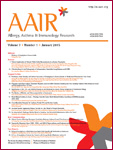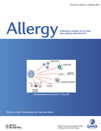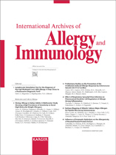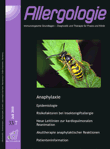
Egyptian Journal of Pediatric Allergy and Immunology
Scope & Guideline
Championing advancements in the understanding of pediatric allergies.
Introduction
Aims and Scopes
- Pediatric Allergy Research:
The journal emphasizes studies that explore various allergic conditions affecting children, including asthma, food allergies, and atopic dermatitis, enhancing the understanding of these prevalent issues. - Immunological Disorders in Children:
Research on immunological diseases such as systemic lupus erythematosus, juvenile idiopathic arthritis, and other autoinflammatory disorders is a core focus, aiming to uncover novel biomarkers and therapeutic approaches. - Impact of Environmental Factors:
The journal investigates the influence of environmental factors, including infections (e.g., COVID-19), on the development and exacerbation of allergic and immunological disorders in children. - Biomarkers and Genetic Studies:
There is a strong emphasis on identifying biomarkers for various pediatric conditions and exploring genetic predispositions, such as single nucleotide polymorphisms related to asthma and autoimmune diseases. - Interdisciplinary Approaches:
The journal supports interdisciplinary research that combines insights from immunology, genetics, and environmental sciences to address complex pediatric health issues.
Trending and Emerging
- Impact of COVID-19 on Pediatric Health:
There is an increasing focus on the effects of COVID-19 on children with pre-existing immunological conditions, indicating a need to understand the intersections between infectious diseases and chronic health issues. - Novel Biomarkers for Disease Monitoring:
Research is trending towards the discovery of new biomarkers for monitoring disease activity in conditions like juvenile systemic lupus erythematosus and juvenile idiopathic arthritis, highlighting the importance of precision medicine. - Psychosocial Aspects of Allergic Conditions:
There is a growing interest in studying the psychosocial implications of allergies and immunological diseases in children, recognizing that these conditions impact quality of life and mental health. - Genetic and Epigenetic Influences:
Emerging studies are increasingly examining the genetic and epigenetic factors contributing to pediatric allergies and autoimmune diseases, indicating a shift towards understanding the hereditary aspects of these conditions. - Interventions and Lifestyle Modifications:
Research on the effects of dietary changes and lifestyle modifications on managing allergic conditions is gaining traction, reflecting an interest in holistic approaches to treatment.
Declining or Waning
- General Allergy Awareness:
Previously common topics regarding general allergy awareness and education have diminished, possibly due to an increase in more specialized studies that provide deeper insights into specific conditions. - Food Allergy Management:
While food allergies remain important, the frequency of studies solely focused on basic management strategies has decreased in favor of research on the underlying mechanisms and genetic factors influencing food allergies. - Traditional Immunotherapy Studies:
Research centered on traditional immunotherapy approaches for allergies has become less frequent, suggesting a shift towards exploring novel therapies and personalized medicine. - Overviews and General Reviews:
The number of broad overviews and general reviews on pediatric allergy has waned, possibly as the journal aims to prioritize original research and novel findings.
Similar Journals

Pediatric Rheumatology
Empowering healthcare with innovative insights in pediatric rheumatology.Pediatric Rheumatology is a leading peer-reviewed open access journal published by BMC, dedicated to disseminating high-quality research in the field of pediatric rheumatology. Since its inception in 2007, the journal has established itself as a vital resource for healthcare professionals, researchers, and students focused on pediatric immunology, rheumatology, and child health, maintaining an impressive Q1 ranking in Pediatrics and Q2 in Immunology and Allergy as well as Rheumatology for 2023. It is recognized for its impact on advancing knowledge and clinical practice, with significant contributions noted in various studies and case reports. With access options that embrace the ethos of open science, all articles published in Pediatric Rheumatology are freely available, promoting collaborative research and discussion among practitioners across the globe. The journal welcomes submissions that encapsulate innovative research, clinical trials, and reviews that address both current challenges and advancements within the pediatric rheumatology landscape.

Allergy Asthma & Immunology Research
Innovating solutions for allergy and asthma challenges.Allergy Asthma & Immunology Research, published by the Korean Academy of Asthma Allergy & Clinical Immunology, is a leading journal dedicated to advancing the fields of immunology, allergy, and respiratory medicine. With an ISSN of 2092-7355 and an E-ISSN of 2092-7363, this esteemed publication has been a cornerstone for researchers and practitioners since its inception in 2009 and continues to disseminate critical findings through till 2024. The journal is ranked in the Q3 category in Immunology and the Q2 category in Immunology and Allergy as well as Pulmonary and Respiratory Medicine, illustrating its impact in these vital fields. With a solid Scopus ranking in multiple sub-disciplines, the journal not only contributes to the scientific discourse but also promotes innovative research and clinical practices. Although currently operating without an open access model, the journal remains highly regarded for its thorough peer-review process and commitment to academic excellence, making it an essential resource for professionals, researchers, and students passionate about advancing knowledge in allergy, asthma, and immunology.

ALLERGY
Illuminating Innovations in Allergy and Immunology.ALLERGY is a leading international journal published by WILEY, dedicated to advancing the understanding of allergic diseases and immunology. With an ISSN of 0105-4538 and an E-ISSN of 1398-9995, this esteemed journal has been at the forefront of the field since its inception in 1948 and continues to publish high-quality research up until 2024. Positioned in the Q1 category for both Immunology and Allergy, ALLERGY ranks impressively within the top percentiles of its categories, underscoring its significant impact, as reflected in its Scopus rankings (#11 out of 233 in Immunology and Allergy, and #14 out of 236 in Immunology and Microbiology). Researchers and practitioners accessing this journal can expect a rigorous selection of peer-reviewed articles that address current challenges, innovative therapies, and advancements in the immunological sciences. Although it is not an open-access journal, ALLERGY remains vital for academics, healthcare professionals, and students alike, fostering a deeper understanding of the mechanisms and treatments associated with allergies.

INTERNATIONAL ARCHIVES OF ALLERGY AND IMMUNOLOGY
Exploring Innovative Solutions for Allergic Diseases.INTERNATIONAL ARCHIVES OF ALLERGY AND IMMUNOLOGY, published by KARGER, is a distinguished journal dedicated to advancing the field of immunology and allergy research. With an ISSN of 1018-2438 and an E-ISSN of 1423-0097, this journal has been a vital resource since its inception in 1950, continuing to publish influential articles through 2024. Hailing from Switzerland, it holds an important position within the Q3 category in Immunology and Allergy and Q2 in miscellaneous Medicine, reflecting its growing impact in the scientific community. The Scopus rankings showcase its relevance, with a 52nd percentile in Immunology and Allergy and 45th in Immunology and Microbiology. Although not an open-access journal, it plays a critical role in disseminating significant findings and innovations in the understanding of allergic diseases and immunological responses. The INTERNATIONAL ARCHIVES OF ALLERGY AND IMMUNOLOGY is essential for researchers, clinicians, and students eager to stay at the forefront of allergy and immunology developments.

Asia Pacific Allergy
Advancing Allergy Insights Across the Asia PacificAsia Pacific Allergy, published by Lippincott Williams & Wilkins, is a prominent academic journal dedicated to advancing research and clinical practice in the fields of dermatology, immunology, and allergy. With its ISSN 2233-8276 and E-ISSN 2233-8268, the journal provides a platform for innovative studies and reviews that cater to an international audience of researchers, healthcare professionals, and students involved in allergy and related disorders. Although it does not currently offer open access to its publications, the journal's robust output from 2015 to 2017 and its ongoing contribution to the literature from 2021 to 2024 showcase the evolving landscape of allergy research in the Asia Pacific region. Recognized in the 2023 Journal Citation Reports, it holds a Q2 ranking in Dermatology and a Q3 ranking in Immunology and Allergy, while its Scopus ranks further emphasize its significance within these domains, positioning it among the top journals in the field. As a source of cutting-edge research, Asia Pacific Allergy plays a vital role in fostering collaboration and knowledge dissemination, ultimately assisting in the betterment of patient care and treatment strategies across the region.

Current Allergy & Clinical Immunology
Connecting diverse voices in allergy and immunology.Current Allergy & Clinical Immunology is a vital peer-reviewed journal published by the Allergy Society of South Africa, focused on advancing the field of immunology and allergy medicine. With an ISSN of 1609-3607, this journal offers crucial insights and research findings pertinent to the understanding and treatment of allergic conditions. Operating from South Africa, it features contributions from a diverse range of authors and professionals in the field. Published from 2008 to 2024, the journal plays an essential role in disseminating current knowledge, even as it holds a Q4 ranking in Immunology and Allergy and is positioned at the 4th percentile based on Scopus rankings. While not open access, it remains an important resource for researchers, practitioners, and students looking to stay informed on emerging trends and breakthroughs in allergy and clinical immunology.

Postepy Dermatologii i Alergologii
Exploring the forefront of skin and immune health.Postepy Dermatologii i Alergologii is a distinguished Open Access journal published by TERMEDIA PUBLISHING HOUSE LTD, dedicated to advancing the fields of Dermatology and Immunology and Allergy. Since its inception in 2003, this journal has served as a vital platform for researchers and practitioners alike, promoting knowledge sharing and collaboration in Poland and beyond. With a current impact ranking placing it in the Q3 quartile for both Dermatology and Immunology and Allergy categories, it plays a significant role in contributing to academic discourse within these fields. The journal is indexed in Scopus, with respectable rankings reflecting its relevance and quality—#65/142 in Dermatology and #163/233 in Immunology and Allergy. Researchers are encouraged to explore a vast array of innovative studies and reviews, making it an essential resource for anyone seeking to stay at the forefront of dermatological and allergic research. For those interested in discovering groundbreaking findings and contributing to the ongoing dialogue in these disciplines, Postepy Dermatologii i Alergologii offers not only free accessibility but also a commitment to scholarly excellence.

ALLERGOLOGIE
Illuminating the Complexities of Immune ResponsesALLERGOLOGIE is a prominent academic journal dedicated to the field of immunology and allergy, published by DUSTRI-VERLAG DR KARL FEISTLE in Germany. Since its inception in 1978, the journal has provided a vital platform for researchers, clinicians, and students to disseminate their findings, share insights, and foster advancements in the understanding of allergic diseases and immunological responses. With an ISSN of 0344-5062 and an E-ISSN of the same number, it is a respected source within its category, currently ranked in the 2023 Q4 of the Scopus metrics in immunology and allergy, reflecting its commitment to quality and scholarly rigor. Although not fully open access, ALLERGOLOGIE makes significant contributions to the dialogue on allergy-related topics, encouraging engagement from its readership through a diverse array of articles that span from clinical trials to innovative research methods. This journal continues to be an essential resource for anyone involved in the pursuit of knowledge in allergy and immunology.

Allergy Asthma and Clinical Immunology
Innovating solutions for allergy and asthma challenges.Allergy Asthma and Clinical Immunology, a pioneering open access journal published by BMC, has been at the forefront of immunological research since its inception in 2005. With an ISSN of 1710-1492, this UK-based journal has established a significant presence in the fields of Immunology, Allergy, and Pulmonary and Respiratory Medicine, achieving notable quartile rankings such as Q2 in Immunology and Allergy in 2023. It plays a crucial role in disseminating high-quality research that advances our understanding of allergy and asthma, making substantial contributions to clinical practices and public health. The journal embraces the principles of Open Access, allowing researchers, professionals, and students from around the globe to access its content freely, thus facilitating knowledge sharing and collaboration within the scientific community. As it converges towards 2024, Allergy Asthma and Clinical Immunology continues to attract impactful studies that drive innovation and improve patient care in the face of rapidly evolving challenges in immunological health.

AIMS Allergy and Immunology
Empowering Global Collaboration in Immunological ResearchAIMS Allergy and Immunology is a prestigious open access journal dedicated to advancing knowledge in the fields of allergy and immunology. Published by the American Institute of Mathematical Sciences (AIMS), this journal provides a vibrant platform for researchers, practitioners, and scholars to share groundbreaking findings and insights. Recognized for its commitment to disseminating high-quality research since its inception in 2017, AIMS Allergy and Immunology contributes significantly to the understanding of complex immunological mechanisms and allergic responses, thus playing a pivotal role in enhancing clinical practices and therapeutic strategies. With its ISSN 2575-615X, the journal aims to facilitate a robust exchange of ideas and promote collaboration within the scientific community. Researchers and practitioners are encouraged to access the latest studies and reviews, which are all freely available online, ensuring that vital information reaches a global audience without barriers. Together, we can tackle the challenges posed by allergies and immune disorders through rigorous scientific inquiry and innovation.